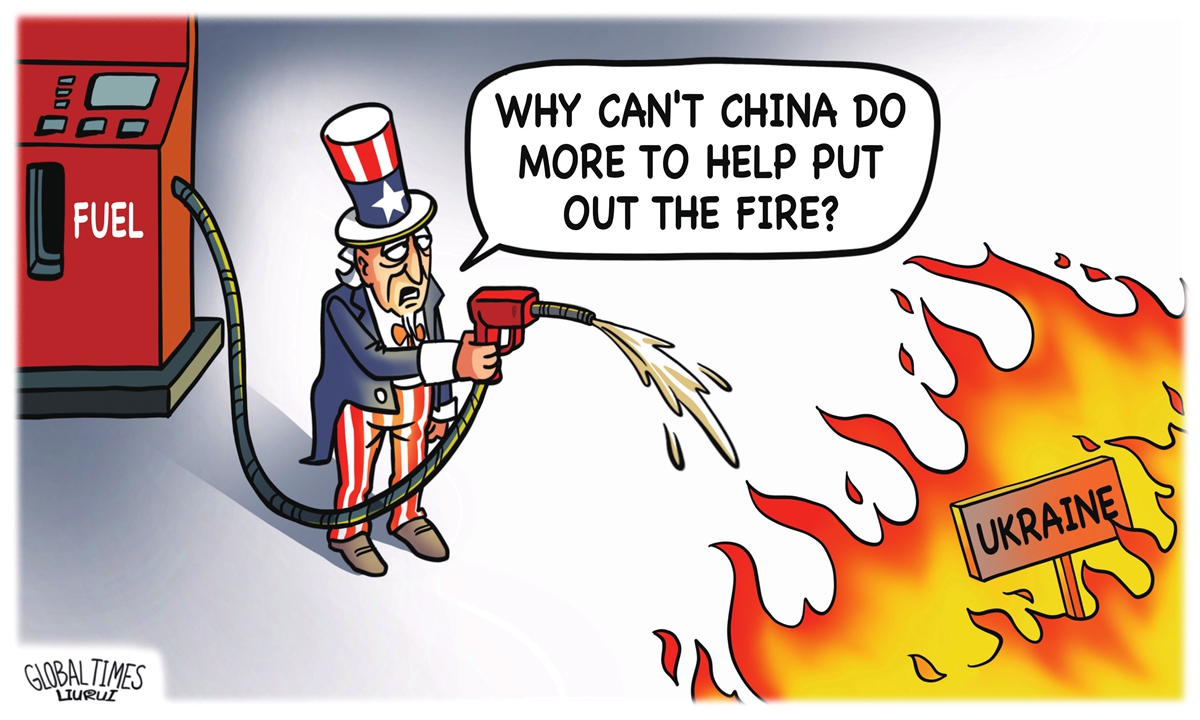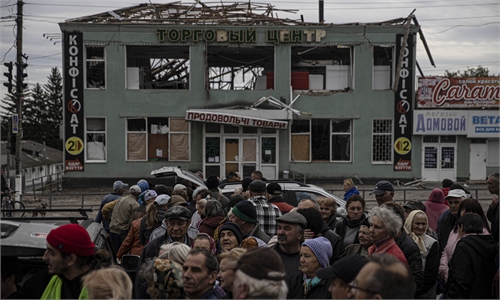China has never been involved in Russia-Ukraine conflict: Global Times editorial

Illustration: Liu Rui/GT
The situation on the battlefield of the Russia-Ukraine conflict has taken a complicated turn in recent weeks. According to Ukrainian President Volodymyr Zelensky on Monday, the Ukrainian army has recaptured 6,000 square kilometers of territory since the "counteroffensive" was launched in early September. However, Russia publicly explained that its troops withdrew on its own initiative to regroup "to liberate Donbass." The actual situation is still unclear, but the US and Western media couldn't wait to celebrate Ukraine's "big victory in the counteroffensive." While aiming their guns at Russia, some have fired hidden arrows at China.Hal Brands, a professor of political science at the Johns Hopkins University in the US, recently tweeted that "if Russia's battlefield situation in Ukraine is as bad as it seems, it will create serious dilemmas for China." Some US and Western media also claimed that Ukraine's rapid advances have "certainly left China in an uncomfortable position." and even called for China to "draw lessons from Russia." These arguments are both absurd and vicious. They first demoralize Russia by magnifying its "defeat" on the battlefield and then convert it into a "defeat" of China in a far-fetched way. According to the logic of the West, they either "bind" China and Russia tightly or attempt to create a rift between the two countries.
To be precise, such expressions have mostly exposed the US and Western elites' secret wishes. In particular, the inclusion of China, which is neither a party concerned nor a culprit of the conflict, is not based on facts at all, but is driven by malicious motives. China has never been involved in the Russia-Ukraine conflict, so how can the situation of "he who rides a tiger is afraid to dismount" be applied to China?
It should be emphasized that China's position on the conflict between Russia and Ukraine has always been the same, and the nature of Beijing's relationship with both Moscow and Kiev has also not changed. China has always stood for respecting the sovereignty and territorial integrity of all countries, abiding by the purposes and principles of the UN Charter, attaching importance to the legitimate security concerns of all countries, supporting all efforts conducive to the peaceful resolution of the crisis, and committing itself to promoting peace talks to ease the humanitarian situation. China consistently opposes unilateral sanctions and long-arm jurisdictions that have no mandate from the UN Security Council. Both the Russian and Ukrainian sides have expressed appreciation for China's objective and impartial position on the Ukraine issue.
On this matter, China has never added fuel to the fire, nor did it take advantage of the opportunity to seek geopolitical self-interests, unlike the US and the West, which have continued to make provocations and want to use Ukraine to bring down Russia. Not only that, the outbreak of the conflict between Russia and Ukraine is regrettable, and we are worried about the protracted conflict and the development of a war of attrition. No matter how the situation on the battlefield changes, it is a definite and hazardous fact that the factors that led to the outbreak of the conflict between Russia and Ukraine have not been resolved, but have become more serious. Except for those with geopolitical ambitions, who else would see such an outcome as a victory?
Many American and Western media and politicians have emphasized in a high-profile manner that the weapons of the US and NATO have helped Ukraine "dramatically reverse the situation," forming an atmosphere of public opinion that strengthens the delivery of weapons to Ukraine. Some reports, citing senior US defense officials, said that Washington and its allies are discussing Ukraine's long-term needs, such as the possibility of supplying Kiev with fighter jets in the "medium and long term." On one side is Washington's desire to fight "to the last Ukrainian," and on the other is Russia's emphasis on continuing the special military operation "until all the goals that were originally set are achieved." This likely means that the bloodshed won't stop anytime soon, and may turn into a prolonged stalemate. The damage caused by this trend is not only reflected in the brutal battlefield.
The Russia-Ukraine conflict has lasted for more than 200 days. It has had a significant impact not only on the people of Russia and Ukraine. In addition, the ordinary people in Europe and many developing countries are suffering from the disastrous geopolitical consequence. Recently, a former British MP pointed out that "this is the US being willing to fight to the last drop of Ukrainian blood and being ready to fight to the last European." Now Washington wants to further drain Ukraine's geopolitical value, trying to forcibly drag China into the conflict between Russia and Ukraine in every possible way. Such greed is really ugly. Washington's bottom line is lower than the world can imagine.

